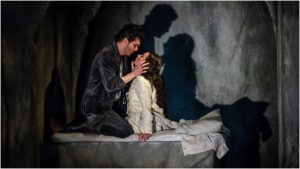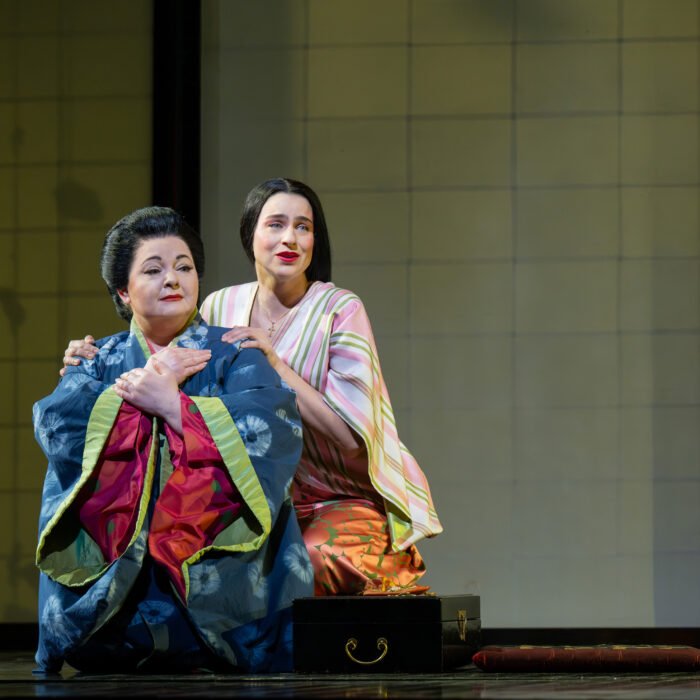
Bard Summerscape 2018 Review: Demon
Anton Rubenstein’s Forgotten Opera Gets a Definitive Production
By Matt CostelloIn order to review Bard Summerscape’s production of Anton Rubinstein’s seldom-heard opera, “Demon,” it may be best to actually review the work itself. This isn’t, after all, the super-familiar “La Bohème” we are talking about.
While apparently the opera has found favor and a niche in the Russian Motherland, it is largely unknown throughout the rest of the known operatic world. There is, in fact, just a single recording of the piece, performed live at the Wexford Festival. And that’s it.
And since I like to come to new works — unknown works — cold, avoiding other reviews and comments, that is exactly what I did here.
The Work
The libretto, by Pavel Viskovatov, was based on a poem by Mikhail Lermontov. It tells a semi-Faustian tale of “The Demon,” stranded between heaven and hell. The Demon enjoys inflicting all sorts of horrors on planet Earth and the humans who inhabit it, from earthquakes to floods. He craves excitement and passion, and if it takes a good old disaster to make that happen, so be it.
But, as is often the case, he is vulnerable to the charms of the beautiful Tamara, betrothed to Prince Sinodal. As the Prince races to her with his army for the big royal wedding, she waits. Meanwhile, The Demon thinks about that to do about the situation.
In this case, he sends (somehow!) an opposing army of infidels to kill the Prince and his men. In Act two, Tamara – who has been ever more increasingly hearing three passionate words of the smitten Demon (which no one else, of course, notices) — learns that the wedding is off, with her fiancé Prince now dead. And after the frivolity of the expectant wedding party (we know the Prince is dead, the guests do not), with multiple ballets included, Tamara falls apart and her father sends her off to a Convent.
But in Act three, The Demon makes his final pleas to urge Tamara to join him in his free and passionate existence, forgetting peace. And after a lot of prolonged debate, she agrees. Sadly, when The Demon kisses her, Tamara dies. And as the angel who we first spotted in Act one re-appears to claim and save Tamara’s soul, the Demon is once again left alone and abandoned.
There you have it. As I mentioned, semi-Faustian. But it seemed to me the tale is certainly without the resonance of Goethe’s tale, or any of its operatic iterations, three of which are masterpieces.
Musical Inconsistency
But music can make one forget and forgive a lot. And in this case., “Demon” is, for me, a mixed bag. There are true moments of beauty and invention, most centered on the big choral scenes of Act two and Tamara’s breakdown.
But then there are repetitive folk-like melodies popping up here and there, and — while using the musical vocabulary of the late-Romantic — the music seems, once again, often uninspired.
There are some bravura opportunities for the lead singers which I will get to in discussing the actual performance below. But just as often, the music seems to struggle to soar.
That said, now we can onto the performance. And there, “Demon” received what I can only say was a defining production.
Dominant Diva
The cast was entirely Russian. All performed this native music with as much passion and power as one could ask for.
Playing the tormented Tamara, Olga Tolkmit, in her metal disintegration and growing obsession with her Demon, dominated the piece. And her voice was up to the task. It is stirring, powerful, and absolutely stunning at some moments, such as when she is curled up on the floor, stricken with grief. Here, her soprano flew above the full orchestra.
Her acting, as both the excited, prospective bride, and the haunted woman who has lost her love and planned life, was convincing, bubbly at times, desperate at others.
Demon
She was matched her Demon, bass-baritone Efim Zavalny in a role one performed by Feodor Chaliapin. Zavalny’s suave and strong voice is also given a lot to so throughout the opera, but it is Act three where he is given the most to do, as he struggles to persuade Tamara to join him. He looked the part as well, leonine as he prowled above the convent “cells,” patiently trying to win this human to his demonic life style.
As to the music, you can see above. Flashes of power and beauty. But for me, just flashes. When compared to other works Zavalny has sung in, such as “Eugene Onegin” and “Don Giovanni,” well – this piece simply can’t compare. But the voice kept the character front and center, even when — as in Act two — he mostly acted as unseen puppet master to the emotions ranging through the wedding party, now no “party” at all.
Other Great Cast Members
Another vocal standout for me was the doomed Prince Sinodal, sung by Alexander Nesterenko. His extended aria, before the disaster of an ambush occurs, was sung in a ringing, crystalline tenor voice. With music that largely matched that ringing voice, we regret that he is slain so early.
Both Andrey Valentii as Tamara’s father, Prince Gudal, and Yakov Strizhak as an Old Servant, make their moments in Act two moving and beautiful. Valentii was especially given much to sing (and protest) as Tamara begs to be sent away. And his performance made us forget that the debate seems rather pointless.
While the musical idiom is late-Romantic, Conductor Leon Botstein gave all the “big” moments the heft and shimmering quality it needed.
And in those moments that really did reach the heights, such as the massed chorus in Act two, both the orchestra and the chorus — following Botstein’s lead — made them exciting and visceral. It was at that grand opera moment, stage full, that I thought that I would love to hear this section again. The American Symphony Orchestra, which performs with Botstein as its director through the year, remains, for me, a relatively hidden wonder of the New York music scene. If you have not heard them play at the Gehry-designed Sonosoff Thetare on the campus of Bard University, you have missed something.
Staging Delight
And it’s equally important to mention how effective the staging was. The use of projections and even film, mixed with scads of cloth material, such as the sheets being washed in Act one or the wedding canopy later, are sumptuous and visually stunning. The cloistered rooms of the convent, with The Demon prowling above, made for a striking and clear image of the demonic reaching down to someone of purity and beauty.
Most of the stage direction by Thaddeus Stassberger, who did many previous Bard Summerscape productions, works well. Supported with sets by Paul Tate dePoo III and lighting by JAX Messenger, memorable visual images appeared on the stage. Rose petals flew up on the sky in anticipation of nuptials to come. A foggy smoke made the attacking army look ghost-like. The sequence of arches that framed the set were quickly responded visually with all the changes in mood and location.
It was a visual style that even a big house like The Met could be proud of.
And did I mention there is ballet? Even masterpieces like “Aida” or “Otello” do not escape what many see as the burden of the obligatory Act two ballet. Usually I would agree, though in most cases the short dance sequences are rather painless.
Here the choreography shined, with the dozen-strong dance troupe performing in a style that felt as Russian as the cast, and with good reason. The troupe was the Pesvebi Georgian Dancers, and their time on stage was bracing.
The men dancing with Cossack like steps and kicks, dervish-like twirls, while the women reflected those moves with a graceful, totally in-sync precision. It is isn’t often you see someone cartwheel across the stage on their knees. Each new sequence seemed designed to show what a real troupe of Russian dancers can do with this music and movement.
I’ve been a fan of Bard’s Summerscape for many years now, with its focus on one composer (this year, Rismky-Korsakov), and their influences and contemporaries.
Nestled among a full summer’s schedule of brilliant performances, are lectures and other educational events that make this a rather special festival. I’m always left anticipating the next season’s Summerscape, with its focus and daring programming.
And it is exactly that daring nature that makes me applaud Rubinstein’s “Demon” being done. Even his contemporaries, the so-called Big Five composers of Russia who were invited to a special performance, weren’t exactly bowled over. But hearing such a piece we get an insight to its composer, the time…and also experience moments where the work comes to vibrant life.
Will it become a staple of major US and European houses? Unlikely. But we should thank Bard for the opportunity to experience it, in a dramatic, stunningly-staged performance, led by the always brilliant American Symphony Orchestra.


